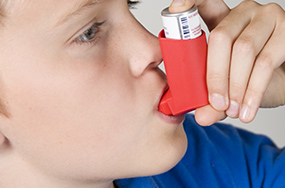Asthma is Chronic Inflammation of the Respiratory Tract.
 People with asthma have very sensitive airways caused by inflammation, which causes increased mucus production.
People with asthma have very sensitive airways caused by inflammation, which causes increased mucus production.
Mucus lingering in the bronchial tubes causes a response in the form of a cough. The coughing occurs frequently more in the morning and at nighttime.
Further inflammation is causing swelling of the bronchial wall, as well as spasm of muscles in surrounding bronchi. That, in turn, is responsible for wheezing (whistling sounds coming from the lungs), shortness of breath, chest tightness and heaviness.
The treatment for asthma is very important because, in some people, poorly controlled asthma may result in permanent damage and scarring to the lungs. There are several factors which can cause asthma to flare up. Those are called “TRIGGERS.”
Triggers include:
- Allergies
- Cigarette smoke
- Dirty air – pollutants, perfumes, solvents, soaps, and chlorine
- Infections – colds, flu, sore throats, sinus infections
- Heartburn. Actually, 70% of people with asthma have acid reflux
- Weather – dry wind, cold air, sudden weather changes
- Exercise
- Strong motion – such as laughter, crying
- Some medications
Usually, the diagnosis of asthma is not difficult to make based on the patient’s history and physical examination, as well as specific tests, such as Spirometry. However, milder forms such as cough, tightness and heaviness, may go undiagnosed for a while. Anyone with a couple exacerbations of asthma requiring Emergency Room visits, hospitalizations, or oral steroids, should be evaluated for asthma by an allergist, according to the national medical guidelines.
Asthma in children has unique risks due to the fact that children’s airways are already narrower and less stiff than adults. So, even a small amount of inflammation and swelling can cause serious problems. Frequently, the only signs of asthma in children are a persistent cough at nighttime, especially after an upper respiratory infection or exercise.
Asthma affects about 4-8% of pregnant women. Any woman, who has asthma while being pregnant, should be monitored for her level of asthma symptoms because poorly controlled asthma may be dangerous for the developing baby. The medications used for asthma control are safe to use during pregnancy. However, we strive to use the lowest possible dose of those medications that still provided good asthma control.






